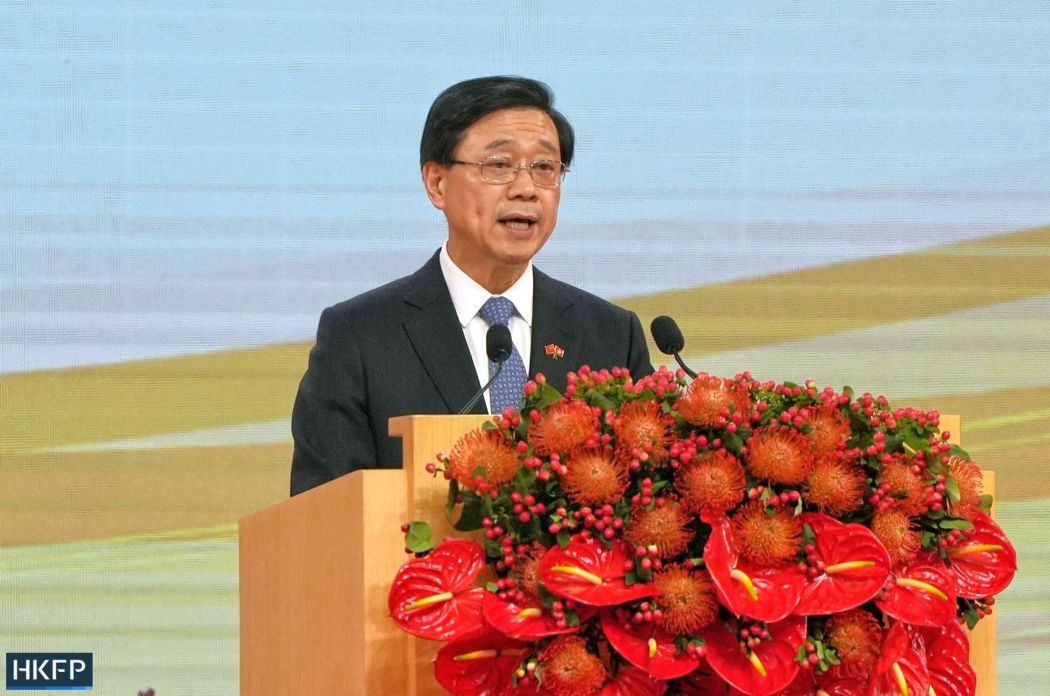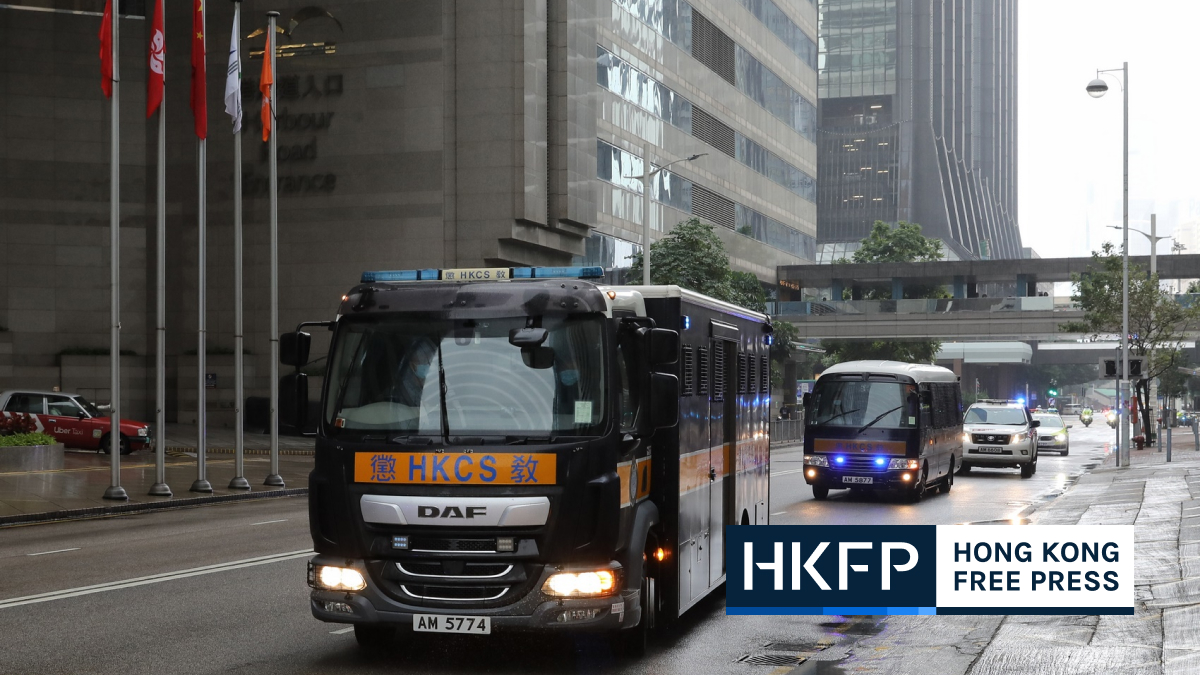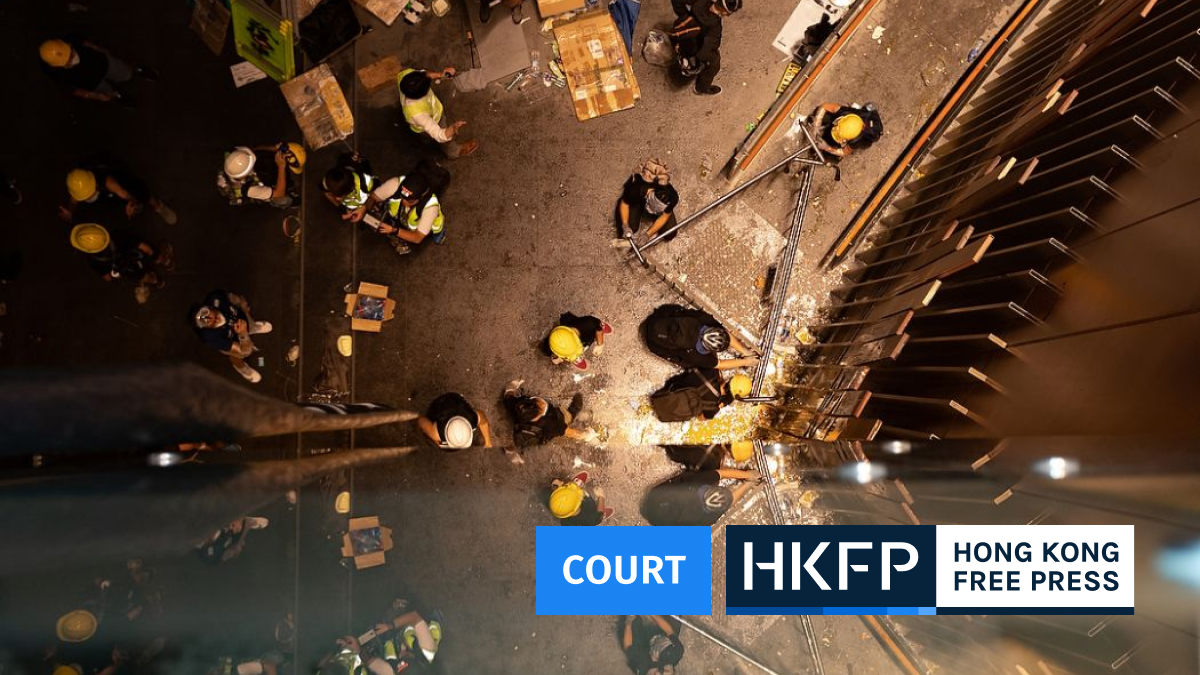Hong Kong must stay vigilant against “soft resistance” and be proactive in safeguarding national security, Chief Executive John Lee has said as the city marked 26 years since its Handover from Britain to China.

Celebrations for the 26th anniversary of Hong Kong’s return to Chinese rule began on Saturday morning, with top government officials and other guests donning a patriotic pin which featured the Chinese national flag and the regional flag at a flag-raising ceremony and reception.
For the first time in three years, attendees gathered at Golden Bauhinia Square without face masks after the city scrapped its last remaining Covid-19 curbs in March. Among those on the front row of the flag-raising ceremony were Lee, former chief executives Carrie Lam, Leung Chun-ying and Donald Tsang, Chief Justice Andrew Cheung and the director of China’s liaison office in Hong Kong Zheng Yanxiong.
Speaking at the reception, Lee referred to a speech delivered by Chinese leader Xi Jinping on the handover anniversary last year. Xi had made it clear that the One Country, Two Systems policy was “tested repeatedly in practice” and the city must adhere to it in the long run, Lee said.

The chief executive, who was inaugurated on the Handover anniversary, said his administration had “led Hong Kong out of the darkness of the epidemic” over the past year. The government did not back down during its fight against Covid-19, allowing the city to resume travel with mainland China and reconnect with the world.
“We are now driving down the fast lane of recovery at full speed,” Lee said.
The directions Xi gave on what Hong Kong must do — including implementing “patriots ruling Hong Kong” and alleviating livelihood issues — formed the basis of his governance blueprint, Lee said, adding he and his “pragmatic team” aimed to unite the community and build a “better Hong Kong.”
The Hong Kong leader pointed to a growth rate of 2.7 per cent in the first quarter of 2023 and said the city had emerged from the shadow of economic contraction. He also said that the city had seen more than 10 million visitor arrivals in the first five months of 2023, saying tourism and consumption stimulated economic recovery.

Lee went on to say that although society was largely stable, Hong Kong was “intentionally target and oppressed” by some countries, which “misjudged” that he described as China’s peaceful development.
“I have full confidence in Hong Kong, yet we must stay alert,” Lee said.
“Destructive forces using ‘soft resistance’ means are still lurking in our city. We must stay vigilant and be proactive in safeguarding national security, and should fully and faithfully implement the principle of One Country, Two Systems,” he added.
A video was played at the reception which showed the government’s work over the past year. It mentioned the lifting of travel restrictions with the mainland and the rest of the world, as well as the Northern Metropolis and Kau Yi Chau Artificial Islands development plans.

Lee vowed to promote high-quality development and contribute to making China a “great modern country” and to the “great rejuvenation of the Chinese nation.” The government would also adopt a pragmatic approach to build mutual trust and unite all sectors in Hong Kong, he said.
The Hong Kong government first mentioned the term “soft resistance” in late July last year, in a statement objecting what it deemed as unfair criticisms published in a report by the United Nations Human Rights Committee.
The government said at the time that the committee should give “due regard” to “soft resistance acts,” hate speech and publications that had radicalised the public since 2019 when it remarked on law enforcement actions relating to the sedition offence.
Security chief Chris Tang also used this term in April when he was explaining the annual estimates of the Security Bureau to lawmakers. He mentioned the government would stay on guard to attempts by external forces and their agents in Hong Kong to incite hatred against the central and local authorities through media, culture and arts, and other “soft resistance” means.

Although July 1 was traditionally a day for tens – or even hundreds – of thousands of Hongkongers to take their diverse demands and grievances to the streets, the city had not seen any public demonstrations as of late-afternoon on Saturday.
However, a man in his 80s held a banner near the SoGo shopping mall in Causeway Bay on Saturday that read “Repeal the national security law, fulfil the international bill of human rights, release political prisoners, may the Lord watch over Hong Kong.”
He was soon surrounded by police, who took his personal info and escorted him to a nearby MTR station. Police told InMedia they were just taking him to the MTR as it was too crowded near SoGo and man was not under arrest.
Police denied an application to organise the annual march in 2021 citing public health restrictions amid the Covid-19 pandemic. The long-time organiser of the rally, the Civil Human Rights Front, also dissolved after the Beijing-enacted national security took effect a little over three years ago.
Festivities were held at Victoria Park, as a slew of giveaways and discounts were offered across the city to mark the handover anniversary. But few people attended, according to HKFP reporters on the scene.
In June 2020, Beijing inserted national security legislation directly into Hong Kong’s mini-constitution – bypassing the local legislature – following a year of pro-democracy protests and unrest. It criminalised subversion, secession, collusion with foreign forces and terrorist acts, which were broadly defined to include disruption to transport and other infrastructure. The move gave police sweeping new powers, alarming democrats, civil society groups and trade partners, as such laws have been used broadly to silence and punish dissidents in China. However, the authorities say it has restored stability and peace to the city.
Support HKFP | Policies & Ethics | Error/typo? | Contact Us | Newsletter | Transparency & Annual Report | Apps
Help safeguard press freedom & keep HKFP free for all readers by supporting our team

latest national security stories
Support HKFP | Policies & Ethics | Error/typo? | Contact Us | Newsletter | Transparency & Annual Report | Apps
Help safeguard press freedom & keep HKFP free for all readers by supporting our team




























